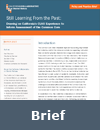Meeting 16
June 30-July 1, 2011
Los Angeles, CA
The California Collaborative on District Reform convened for the sixteenth time on June 30 and July 1, 2011 in Los Angeles. The group explored the ways in which assessments can both help educators understand the knowledge and skills called for by the Common Core State Standards (CCSS) and aid in the monitoring of student progress and application of appropriate supports. The meeting also addressed implications for the California Office to Reform Education's work with districts around the implementation of the CCSS and related assessments. All meeting participants received a briefing book of resources and literature on the rationale behind assessment, unpacking standards for instruction and assessment, and issues of learning progressions and formative assessments; these resources are available below.
Meeting Summary (PDF 753 KB)
Briefing Book
- Cover Letter (PDF 91 KB)
- CORE: Standards and Assessment
- Assessment Consortia
- Next Generation Assessment Systems
- Cognition, Standards, and Assessment
- Unpacking and Assessing Math
- Unpacking and Assessing ELA
- Learning Progressions
- Formative Assessment
Follow-Up
Policy Brief and Overview produced as outcomes from Meeting 16.
Learning from the Past: Drawing on California's CLAS Experience to Inform Assessment of the Common Core (PDF, 183 KB)
September 2012
As California approaches a new system of academic standards, instruction, and assessment, it enters familiar territory. The use of multiple modes of assessment, tight alignment between assessments and expectations for student learning, and a focus on assessment for formative (as well as summative) purposes—all with an emphasis on students' understanding and ability to apply their learning—mirror the state's priorities as it transitioned to the California Learning Assessment System (CLAS) in the early 1990s. These policy and practice briefs examine the CLAS experience to identify lessons for districts as they implement the Common Core today. Through these lessons, districts across the state might build on promising practices from two decades ago while avoiding some of the pitfalls that undermined the CLAS effort.
Updated 2015 Brief
Original 2012 Brief
Overview of Original 2012 Brief

